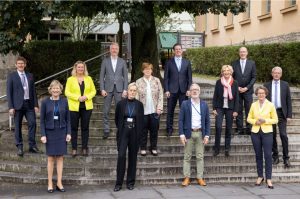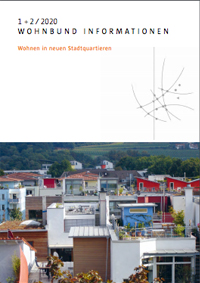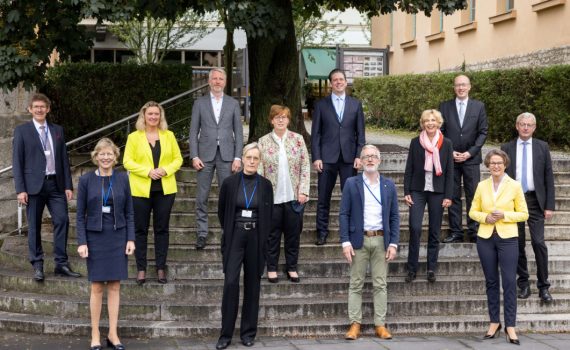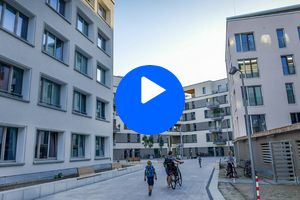The Federal Cabinet today approved the draft of a timber construction initiative presented by Federal Minister of Construction Klara Geywitz and Federal Minister of Agriculture Cem Özdemir. This strategy of the Federal Government is intended to strengthen the use of wood as a sustainable raw material in the construction sector and to ensure more climate protection, resource efficiency and faster construction. With eight fields of action, from the exemplary role of the federal government and the strengthening of research and innovation, to securing skilled labour and knowledge transfer, to securing the supply of raw materials, the use of wood is to be significantly improved and the timber construction quota increased by 2030.
Kategorie für Blog: Affordable housing
Housing industry, architects and municipalities called upon to participate
 Berlin - Affordable and high-quality residential construction is currently more important than ever. For more than three decades, outstanding residential construction projects have been honoured every two years with the German Builder-Owner Award. This year's edition of the competition has now been announced.
The aim of the award, which is sponsored by the Federal Ministry of Housing, Urban Development and Building, is to recognise the responsible efforts of developers to create affordable housing and neighbourhoods of "high quality at affordable costs".
Berlin - Affordable and high-quality residential construction is currently more important than ever. For more than three decades, outstanding residential construction projects have been honoured every two years with the German Builder-Owner Award. This year's edition of the competition has now been announced.
The aim of the award, which is sponsored by the Federal Ministry of Housing, Urban Development and Building, is to recognise the responsible efforts of developers to create affordable housing and neighbourhoods of "high quality at affordable costs".
 The new National Progress Report on the Implementation of the New Urban Agenda shows the state of sustainability in urban development in German municipalities. The report was prepared by the German Institute of Urban Affairs on behalf of the Federal Institute for Research on Building, Urban Affairs and Spatial Development (BBSR).
The new National Progress Report on the Implementation of the New Urban Agenda shows the state of sustainability in urban development in German municipalities. The report was prepared by the German Institute of Urban Affairs on behalf of the Federal Institute for Research on Building, Urban Affairs and Spatial Development (BBSR).
The Special price on the topic "Urban development revisited: Prices - Practice - Perspectives" was given to the project Urban development area Stuttgarter Straße, French Quarter in Tübingen. The special prize, which is awarded in parallel to the urban development prize, serves to highlight particularly urgent fields of action in urban development and urban planning. It was awarded on 23.4.2021 on the occasion of the 40th anniversary of the German Urban Development Prize to contributions that had already been recognised with prizes and awards between 1980 and 2010. The judging of the special prize was very complex, as it had to cover a span of 30 years, i.e. a generation, of the achievements of German urban development that were considered outstanding at the time, and, in retrospect, it had to be based on robust, objective criteria that could adequately reflect the complexity of 30 years of urban development history and 30 years of urban development models.
A new study from Denmark takes a look at the costs of sustainable building construction and shows that more sustainable does not automatically mean more expensive. On the contrary. The study by Buus Consult on behalf of the DGNB system partner from Denmark, the Green Building Council Denmark, now provides clarity. In the study, it takes a close look at 37 DGNB-certified buildings.
 At their meeting in Weimar on 24 and 25 September, the construction ministers of the federal states adopted resolutions on social housing, the use of ecological building materials and the digitalisation of the building permit process, among other things.
The EU's plan to become involved in the area of public housing promotion as part of the new "InvestEU" fund was criticised. The federal government was therefore called upon to advocate a modification of the programme so that subsidies are only granted if the provisions of regional, national or federal funding regimes are observed, in particular if rent and occupancy restrictions are stipulated. The Chairman of the Conference of Building Ministers, Thuringia's Infrastructure Minister Benjamin-Immanuel Hoff, said: "Creating affordable housing in Germany remains an important task. The federal government must continue to provide at least the same level of funding. In order to make faster progress, we need more money in the system. The EU's commitment is therefore to be welcomed in principle. But we must ensure that the funds also reach social housing construction, and we agree that this can best be achieved through the established funding programmes of the federal states."
At their meeting in Weimar on 24 and 25 September, the construction ministers of the federal states adopted resolutions on social housing, the use of ecological building materials and the digitalisation of the building permit process, among other things.
The EU's plan to become involved in the area of public housing promotion as part of the new "InvestEU" fund was criticised. The federal government was therefore called upon to advocate a modification of the programme so that subsidies are only granted if the provisions of regional, national or federal funding regimes are observed, in particular if rent and occupancy restrictions are stipulated. The Chairman of the Conference of Building Ministers, Thuringia's Infrastructure Minister Benjamin-Immanuel Hoff, said: "Creating affordable housing in Germany remains an important task. The federal government must continue to provide at least the same level of funding. In order to make faster progress, we need more money in the system. The EU's commitment is therefore to be welcomed in principle. But we must ensure that the funds also reach social housing construction, and we agree that this can best be achieved through the established funding programmes of the federal states."
Following the interim results of the Housing Summit and the Building Land Commission, demands are being voiced by the scientific community: The still tight housing markets require the use of additional instruments by the federal and state governments. Otherwise, the turnaround towards affordable housing cannot be achieved.
The popular ESA dormitory on the campus of the TU Kaiserslautern (TUK) is in great need of renovation. The foundation's renovation concept for TUK envisions the former experimental building becoming a CO2-neutral building. The estimated costs for the work have not yet been fully raised. Therefore, the ESA residents are participating with a crowdfunding campaign, which has been available on the Startnext platform since September 13.
7-storey timber (hybrid) building. 66 bathroom modules were designed as a complete technical core for the student apartments.
 Climate protection and socially just construction and housing must be considered together - Legal regulations in the rental housing sector and state subsidy practice undermine climate goals in the building sector - Deutsche Umwelthilfe and Deutscher Mieterbund present 10-point immediate programme for socially acceptable design of energy modernisation in existing and new buildings - KfW subsidy practice must be subjected to a reality check - Social provisions must be supplemented by climate policy requirements
Climate protection and socially just construction and housing must be considered together - Legal regulations in the rental housing sector and state subsidy practice undermine climate goals in the building sector - Deutsche Umwelthilfe and Deutscher Mieterbund present 10-point immediate programme for socially acceptable design of energy modernisation in existing and new buildings - KfW subsidy practice must be subjected to a reality check - Social provisions must be supplemented by climate policy requirements
Germany's largest cooperative housing project in Berlin 28:58 min Video available until: 12/02/2020 First broadcast on: 2.12.2019 Living in the metropolis, in a large community, according to its own rules. Central, energy-saving, ecological, cosmopolitan, inclusive. The residents of Möckernkiez in Berlin-Kreuzberg have fulfilled this dream.
24 October 2019 Strengthen energy refurbishment of buildings and demand responsibility from landlords. Housing policy must create supportive framework conditions and thus contribute to the reduction of living space. "For a necessary energy turnaround in the housing industry, conditions must be created that demonstrate tangible incentives for owners and users to consume less energy in the future," [...]
Throughout Germany, the federal government has only granted four plots of land at a lower price so that social housing can be built. Yet it is authorised to do so and is actually required to do so. That the federal government does not take the responsibility for the housing supply in the width of the country very lightly, or at least does not use all its resources in the fight against the [...]
Did Federal Minister for Building Barbara Hendricks (SPD) raise expectations with the Alliance for Affordable Housing and Building that ultimately could not be fulfilled? The parliamentary group of Bündnis 90/ Die Grünen is investigating their doubts about the sense and effectiveness of the alliance in a question. And they want to know: How and when does [...]
Housing is expensive, especially in cities there is a lack of affordable housing. Build, build, build - politicians are relying on private investors here. They are supposed to solve the housing crisis. However, research by the ARD magazine Panorama shows that new private apartments are often unaffordable.









